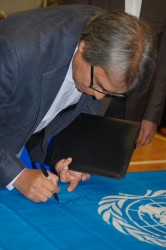Article Origin
Volume
Issue
Year
Denise Montour and Tina Wolfe, both of whom reside on the Maskwacis Cree Nation, were among the 200 or so people to fill the gymnasium at Ermineskin school, in Hobbema, on Oct. 11 to listen to presentations made to United Nations Special Rapporteur James Anaya. Both women are wary about the impact Anaya’s report will have on living conditions for Aboriginal people in Canada.
“It’s not that I doubt him. I would never doubt him,” said Montour, “but who endorsed the United Nations? And I think that’s the key that every individual on the planet has to question. And will that endorsement ever allow us the freedoms we ask for?”
“First Nations people in Canada are unique and (if other people) were to sit down and listen to us I’m sure they would know how the shoes are on our feet. They would know what we go through,” said Wolfe. “Right is right and wrong is wrong.”
But does that mean the Canadian government will move on issues raised or that the international community will apply pressure based on the report filed by Anaya from his eight-day whirlwind tour?
“I hold his position with high regards and it is with great respect that I am here,” said Montour.
International Chief Wilton Littlechild, chair of the UN’s expert mechanism on the rights of Indigenous peoples, says he is hopeful that Canada will seriously consider Anaya’s comments and recommendations from his final report.
“I think given the status of (Anaya’s) appointment, states like Canada, all states where he’s gone to as a mission, need to respect his recommendations and seriously look at them for follow-up. That’s what I’m hoping for in this case,” said Littlechild.
In Anaya’s closing remarks delivered in Ottawa before leaving the country, he said, “The well-being gap between Aboriginal and non-Aboriginal people in Canada has not narrowed over the last several years, treaty and Aboriginals claims remain persistently unresolved, and overall there appear to be high levels of distrust among Aboriginal peoples toward government at both the federal and provincial levels.”
That message came through clearly in the presentations Anaya received in Hobbema.
Chiefs Wallace Fox (Onion Lake Cree), Bernice Martial (Cold Lake) and Allan Adam (Athabasca Chipewyan) all talked about Canada’s inability to honour treaty when it came to economic development and environmental controls on First Nations’ land as well as resource revenue sharing.
“More so than making reference to the (United Nations Declaration for the Rights of Indigenous People), several (of you made reference) to your treaties and I hear the importance of your treaties to the relationship you seek to have with Canada, with the larger society, through your histories, through your place in the world, through your affirmation of your rights,” Anaya said at the end of the public session.
Anaya also heard concerns about education, high cancer rates, racism, murdered and missing Aboriginal women, the relationship with the RCMP, protection of sacred sites and burial grounds, federal funding cuts, and the delivery of programs by non-Aboriginals.
“The concerns that are raised today are of deep concern to me and deep concern I’m sure … to the international community given the human rights nature of those concerns,” said Anaya.
Anaya’s final report will be made public in a few months.
- 1751 views

